Introduction
In this lesson, you will learn how to talk about health in German. You will be able to name different parts of the body, describe common health problems, and give or understand simple advice when someone is sick. The lesson also helps you learn how to ask questions about someone’s health, use correct grammar to say what hurts, and write short messages or emails about being sick.
“Stefan, wie geht’s dir?”
Translation: Stefan, how are you?
Body Parts (Die Körperteile)
Knowing the names of body parts helps you describe where you feel pain. This is useful when speaking to a doctor or friend about your health.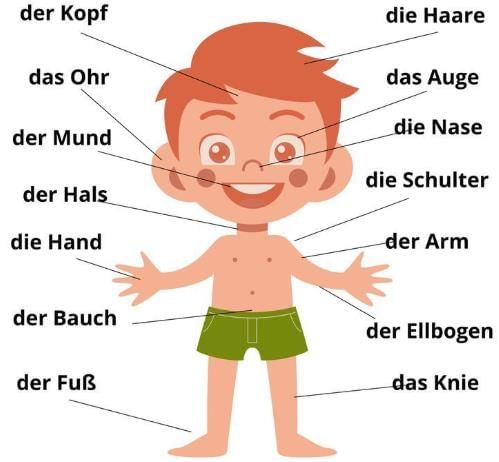
Note: In German, articles are important:
der = masculine
die = feminine
das = neuter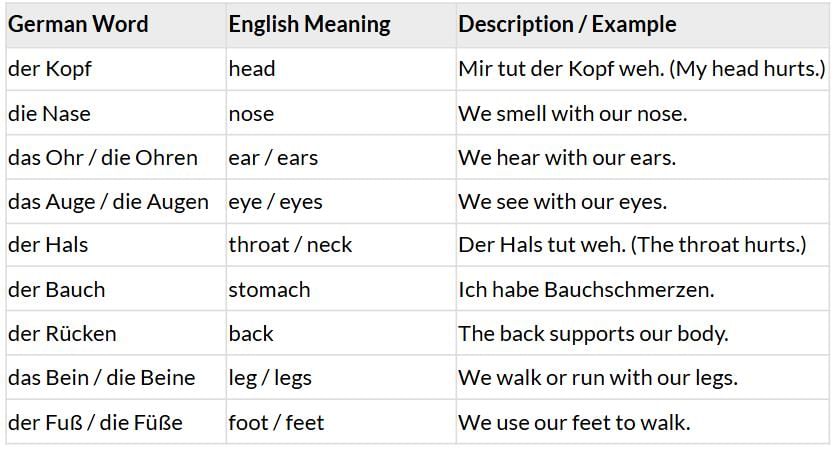
Did you know?
The sweet sugary homeopathy pills your parents give you when you're sick come from Germany. In Germany, they are called ‘Globuli’.
A German man named Samuel Hahnemann is known as the Father of Homeopathy. In his early life, Hahnemann worked as a language teacher and a translator. Later, he studied medicine and created a new kind of treatment called homeopathy. This type of medicine is still very popular in both Germany and India today!
In his early life, Hahnemann worked as a language teacher and a translator. Later, he studied medicine and created a new kind of treatment called homeopathy. This type of medicine is still very popular in both Germany and India today!
Q1: Have you ever taken homeopathic medicine? What do you prefer: homeopathic medicine or allopathic medicine (the kind you get from regular doctors)?
Ans: Yes, I have taken homeopathic medicine before. When I had a cold, my parents gave me small sweet pills called Globuli. They helped me feel better slowly and didn’t have any side effects.
I prefer allopathic medicine when I need quick relief, like for fever or infections. But for small problems like cough or cold, I sometimes prefer homeopathic medicine because it feels more natural and gentle.
Q2. Ein Alien vom Jupiter. Mal eine Tabelle in dein Heft. Schreib die Wörter von Übung 1 in die richtige Spalte.
(An alien from Jupiter. Draw a table in your notebook. Write the words from Exercise 1 into the correct column.)
Der Alien heißt Ypsilon.
Er hat …

einen ______,
eine _______,
ein ________,
zwei ________,
drei ________,
sechs ________,
30 _________.
Ans: The alien is called Ypsilon.
He has …
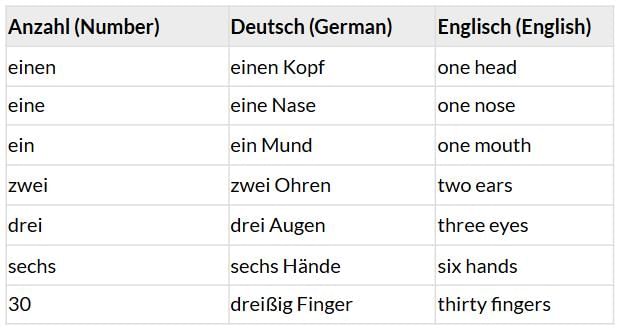
Common Illnesses and Health Problems (Krankheiten)
This section teaches you how to name and describe common illnesses and symptoms in German.
Q: Was fehlt dir, Marion? Ordne zu und bilde dann Minidialoge wie in den Beispielen."
(What’s wrong with you, Marion? Match the items and then create mini-dialogues like in the examples.)
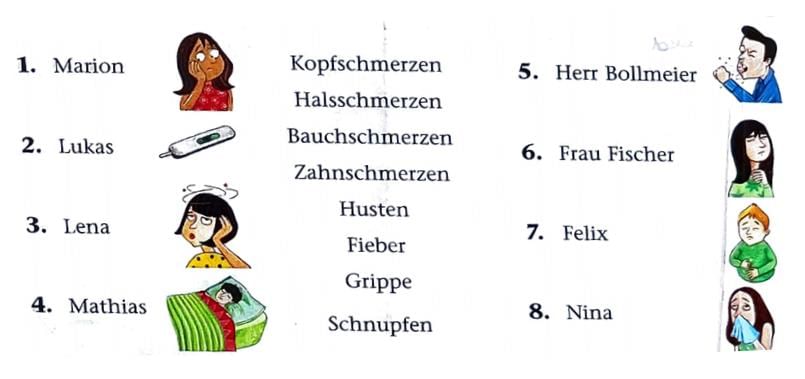
Ans: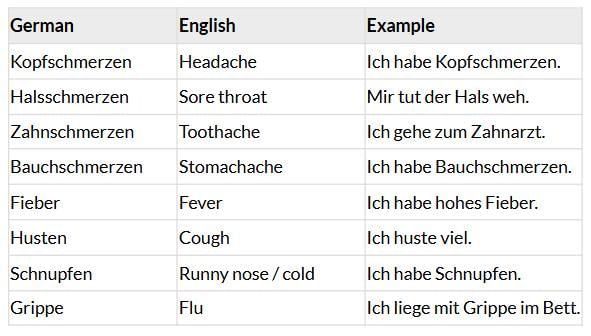
Correct matching as follows:
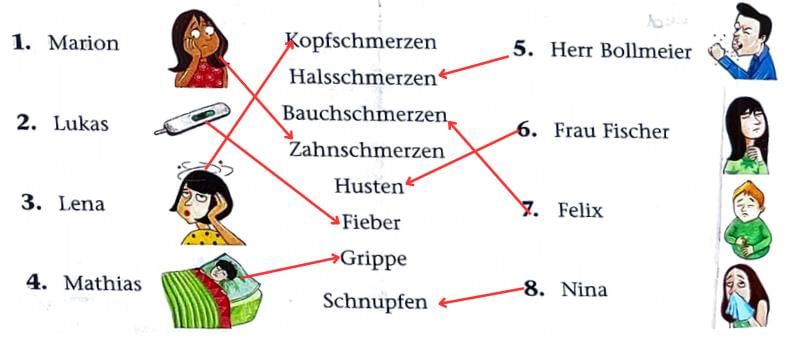
Q: "Was fehlt dir, Marion?" (What’s wrong with you, Marion?)
A: "Ich habe Zahnschmerzen." (I have a toothache.)
Q: "Was fehlt Ihnen, Herr Bollmeier?"
A: "Ich habe Kopfschmerzen."
Talking About Health (Wie geht es dir?)
In this part, you will learn how to ask someone about their health and how to respond when someone asks you how you feel.
In German, the person who feels the pain is in Dative, and the body part that hurts is in Nominative.
Structure:
[Dative person] tut/tun [Nominative body part] weh.

Example Sentences:
Dem Mann tut der Kopf weh.
(The man has a headache.)
Der Frau tut der Bauch weh.
(The woman has a stomach ache.)
Dem Kind tut ein Zahn weh.
(The child has a toothache.)
Dem Jungen tut der Hals weh.
(The boy has a sore throat.)
Dem Mädchen tun die Ohren weh.
(The girl has earache.)
Den Zwillingen tut der Rücken weh.
(The twins have back pain.)
Dem Jungen tun die Füße weh.
(The boy’s feet hurt.)
Asking about health:
Wie geht’s dir? – How are you?
Was fehlt dir? – What’s wrong with you?
Was tut dir weh? – What hurts?
Answering:
Mir geht’s schlecht. – I feel bad.
Ich habe Bauchschmerzen. – I have a stomachache.
Mir tut der Rücken weh. – My back hurts.
Medicines and Home Remedies (Medikamente und Hausmittel)
This section covers common medicines and natural treatments used when someone is unwell.
Correct Matching:
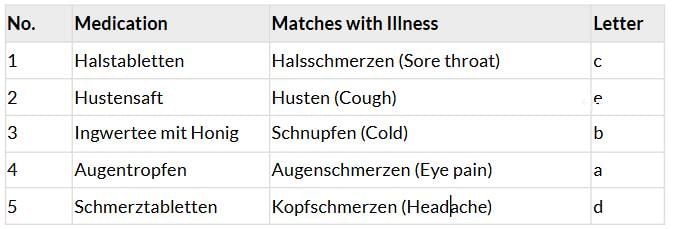
Grammar: “weh tun” + Dative Case
In German, to say that something hurts, you use the verb “weh tun” with the dative case. This section explains how to form these sentences correctly.
Examples:
| Pronoun | Dative Form | Example Sentence |
|---|
| ich | mir | Mir tut der Kopf weh. (My head hurts.) |
| du | dir | Dir tut der Bauch weh. |
| er | ihm | Ihm tut der Hals weh. |
| sie | ihr | Ihr tun die Augen weh. |
| wir | uns | Uns tun die Beine weh. |
| ihr | euch | Euch tun die Füße weh. |
Rule:
Giving Health Advice (Ratschläge)
When someone is sick, it’s polite to give helpful advice. In this section, you learn how to use command forms to give advice.
| German Sentence | English Meaning |
|---|
| Iss gesund! | Eat healthy! |
| Trink viel Wasser! | Drink a lot of water! |
| Schlaf gut! | Sleep well! |
| Geh zum Arzt! | Go to the doctor! |
| Nimm Medizin! | Take medicine! |
| Bleib im Bett! | Stay in bed! |
Note: These sentences are in imperative form (commands) using “du” (you).
Bau Sätze

This is a sentence-building exercise in German (Bau Sätze), meant to help practice forming complete sentences with subjects, verbs, symptoms, reasons, and remedies.
You can build sentences like this structure:
[Subject] + [verb] + [symptom]. Deshalb + [pronoun] + [form of "nehmen"] + [remedy].
Examples:
Dem Mann tut der Kopf weh. Deshalb nimmt er Schmerztabletten.
(The man has a headache. Therefore, he takes painkillers.)
Die Frau hat Husten. Deshalb nimmt sie Hustensaft.
(The woman has a cough. Therefore, she takes cough syrup.)
Den Kindern tun die Augen weh. Deshalb nehmen sie Augentropfen.
(The children have sore eyes. Therefore, they use eye drops.)
Mein Vater hat Grippe. Deshalb nimmt er Ingwertee.
(My father has the flu. Therefore, he takes ginger tea.)
Die Oma hat Schnupfen. Deshalb nimmt sie Kräutertee.
(Grandma has a runny nose. Therefore, she takes herbal tea.)
Ich habe Halsschmerzen. Deshalb nehme ich Halstabletten.
(I have a sore throat. Therefore, I take throat lozenges.)
Wir haben Bauchschmerzen. Deshalb nehmen wir Aspirin.
(We have stomach pain. Therefore, we take aspirin.)
Wortschatz Wiederholen!
Was sagst du?
(What do you say? — Look at the pictures and complete the sentences.)
Use „Mir tut ... weh“ (… hurts me) or „Ich habe …“ (I have …).
a. (The girl touches her head.)
Mir tut der Kopf weh. / Ich habe Kopfschmerzen.
b. (The boy holds his stomach.)
Mir tut der Bauch weh. / Ich habe Bauchschmerzen.
c. (The man holds his throat.)
Mir tut der Hals weh. / Ich habe Halsschmerzen.
d. (The girl touches her cheek, maybe a toothache.)
Mir tut der Zahn weh. / Ich habe Zahnschmerzen.
Ein Wort passt nicht in die Reihe.
(One word doesn’t fit in the group. Pick the odd one out.)
1. Bauchschmerzen – Pickel – Grippe – Fieber
Pickel (Pimples) → The rest are illnesses or symptoms; “Pickel” is a skin condition.
2. Beine – Arme – Finger – Hände
Finger → All others are limbs; “Finger” is part of a hand.
3. Hustensaft – Karottensaft – Kräutertee – Augentropfen
Karottensaft (Carrot juice) → The rest are medicines; “Karottensaft” is food.
Writing a Simple Health Email or Message
You will learn how to write a short message or email if you are sick and want to tell a teacher or friend.
Betreff: Ich bin krank
Liebe Anna,
wie geht es dir? Ich hoffe, dir geht es gut.
Ich bin leider krank. Seit gestern habe ich Halsschmerzen und Fieber. Ich bleibe zu Hause und liege im Bett. Meine Mutter hat mir Kräutertee gemacht. Er schmeckt nicht so gut, aber er hilft.
Ich darf keine kalten Sachen essen. Ich nehme auch Halstabletten. Ich hoffe, dass ich bald wieder gesund bin.
Was machst du, wenn du krank bist? Musst du auch Medikamente nehmen?
Schreib mir bald zurück!
Liebe Grüße
Ben
Subject:I am sickDear Anna,
How are you? I hope you are doing well.
Unfortunately, I am sick. Since yesterday, I have had a sore throat and a fever. I’m staying at home and lying in bed. My mom made me some herbal tea. It doesn’t taste very good, but it helps.
I am not allowed to eat cold things. I’m also taking throat lozenges. I hope I’ll get better soon.
What do you do when you’re sick? Do you also have to take medicine?
Write back soon!
Best wishes,
Ben




 In his early life, Hahnemann worked as a language teacher and a translator. Later, he studied medicine and created a new kind of treatment called homeopathy. This type of medicine is still very popular in both Germany and India today!
In his early life, Hahnemann worked as a language teacher and a translator. Later, he studied medicine and created a new kind of treatment called homeopathy. This type of medicine is still very popular in both Germany and India today!
























